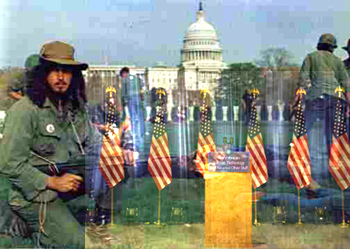|
One Mukluk(continued) "Also," Hockenhokey asked me at a later date,
"how do you know that Adams didn't serve in Vietnam?" I said because that is what Adams told me, time and time
again, and we compared notes with regard to how we each sought to stay
out of Vietnam. That's how. Hockenhokey said: "OK." "Also, don't you know, Harvey," Higgensem told
me over some Fijian coconut clam twisters at Randy Randyman's Blind
Person's Snack Bar on the 5th floor of the Marmalade on a cold Wednesday
morning about a month after Adams disappeared, "that when anyone
whom you like dies, he is ipso facto a Vietnam Veteran?" I said I never thought of it that way, and I had never
heard of that happening. Speaking of Randy Randyman, whom I know we weren't speaking
of, but I'm not sure how good your memory is, when I told him of Adams's
disappearance, he said rather oddly, or perhaps not so oddly after all,
that he was sorry about the news, but he had to admit that he never
remembered seeing the man. By the way, millions of people attended Adams's funeral.
I thought about ten million or so, but Drumrole, who always disagrees
with me, even if he agrees with me, if you know what I mean, thought
that I was exaggerating. He thought it was more in the range of eight
or nine million. I didn't see any utility in arguing the point. Within a few days of Adams's disappearance, Senator Can'tbe,
who was chair of the Senate Committee on Science, Technology and Assorted
Other Stuff and who knew Adams, albeit slightly, issued a press release
saying that Adams's death was the most disturbing thing that he had
ever seen and was probably the most disturbing thing that had happened
since the last most disturbing thing that happened the previous week.
And that he felt certain that most of the Senate was as disturbed as
he was, and perhaps some senators were even more disturbed than he was,
though he said that would be hard to imagine, based on just how disturbed
he really was. "And there weren't any senators who just felt concerned?"
I asked Can'tbe's attractive special assistant, Miss Sitwell, in a telephone
conversation I had with her about a week after Adams's funeral. "Well," she admitted, in her extremely high-pitched
but sweet voice, "maybe just a few, but they don't count." I had lunch with my erudite colleague Taylor-Mailer a
few weeks after the funeral, and he told me that he had given Adams's
disappearance not a little thought, or at least thought not a little
about it, he added with something approaching deep bewilderment, as
was his custom to do, and he concluded it was a question of defaults
for Adams and me, that really defined the differences between us. Why
he thought it was important to define the differences between us, I
have no idea, but I attributed it to Taylor-Mailer's apparently endless
need to come up with theories about just everything. Anyway, Adams's
default, according to T-M, was challenge; mine was accommodation. At
times Adams could be accommodating; at times I could be challenging.
In the end, we always returned to who we really were. That's why, Taylor-Mailer
said, I might be able to convince Adams for a day or two of the value
of finding some middle ground with regard to trying to find something
meaningful to do at DOST, but not for long. There was no middle ground
for Adams — for very long. I thought about what Taylor-Mailer said for a few seconds
and, having come to no conclusion as to whether he was right or wrong,
though I instinctively felt he was probably more right than wrong, I
told him I'd have to think about what he said some more. "What did you say, Harvey?" is what he shouted,
a rustic-looking man in large blue farm overalls and wearing a worn
beige cowboy hat said on the TV news some six months after Adams disappeared.
"I hear it as clearly today as I did on that warm and sultry night
six months ago." |
